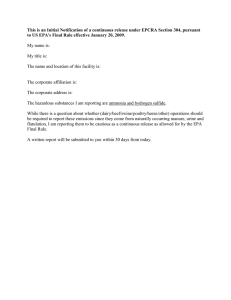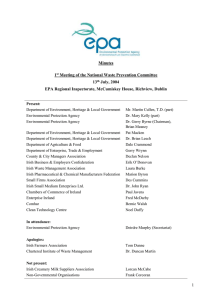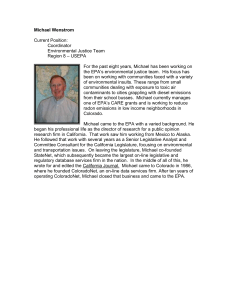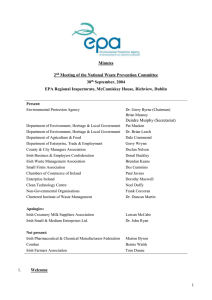Minutes 6th Meeting of the National Waste Prevention Committee 7
advertisement
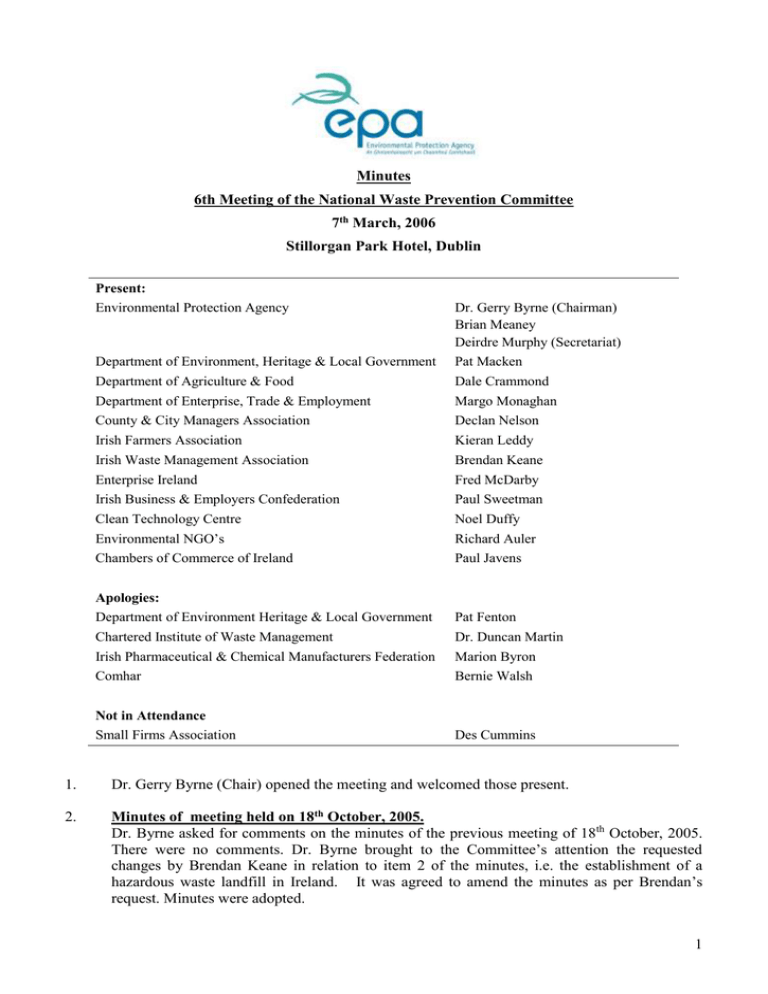
Minutes 6th Meeting of the National Waste Prevention Committee 7th March, 2006 Stillorgan Park Hotel, Dublin Present: Environmental Protection Agency Dr. Gerry Byrne (Chairman) Brian Meaney Deirdre Murphy (Secretariat) Department of Environment, Heritage & Local Government Pat Macken Department of Agriculture & Food Dale Crammond Department of Enterprise, Trade & Employment Margo Monaghan County & City Managers Association Declan Nelson Irish Farmers Association Kieran Leddy Irish Waste Management Association Brendan Keane Enterprise Ireland Irish Business & Employers Confederation Fred McDarby Paul Sweetman Clean Technology Centre Noel Duffy Environmental NGO’s Richard Auler Chambers of Commerce of Ireland Paul Javens Apologies: Department of Environment Heritage & Local Government Pat Fenton Chartered Institute of Waste Management Irish Pharmaceutical & Chemical Manufacturers Federation Dr. Duncan Martin Marion Byron Comhar Bernie Walsh Not in Attendance Small Firms Association Des Cummins 1. Dr. Gerry Byrne (Chair) opened the meeting and welcomed those present. 2. Minutes of meeting held on 18th October, 2005. Dr. Byrne asked for comments on the minutes of the previous meeting of 18th October, 2005. There were no comments. Dr. Byrne brought to the Committee’s attention the requested changes by Brendan Keane in relation to item 2 of the minutes, i.e. the establishment of a hazardous waste landfill in Ireland. It was agreed to amend the minutes as per Brendan’s request. Minutes were adopted. 1 3. Progress on the National Hazardous Waste Management Plan Revision Dr. Byrne explained that the replacement Hazardous Waste Management Plan is a priority for the Core Prevention Team in 2006. Brian Meaney updated the committee on developments to date. The process kicked off in January 2006 with a kick-off meeting with the consultants appointed to prepare a strategy study and strategic environmental assessment, RPS. An international workshop was held on 3 February 2006 in relation to experiences in hazardous waste planning and management in Northern Ireland, Belgium. Netherlands and Denmark. A steering group meeting (comprising the National Waste Prevention Committee) was held on 16 February 2006 to discuss the scoping of the strategic environmental assessment. The first period of consultation has begun. Members of the committee were invited to make submissions either directly to the EPA or to RPS. Closing date for submissions is 3rd April 2006. A short “context report” on the project background is available on the EPA website at http://www.epa.ie/OurEnvironment/Waste/HazardousWasteManagement/. Committee members were asked to provide feedback on (1) feedback on the first plan and its implementation and (2) topics that Committee members would like to see addressed in the second plan. The next input for the Committee will be a workshop on 27th April 2006. A preliminary report on technology and policy options will be placed before the Committee for discussion and feedback. 4. National Waste Report 2004 The committee was updated in relation to the publication and content of the National Waste Report 2004, published in January 2006. Packaging recycling in 2004 was reported as 56%. The target of 50% recycling by 2005 was exceeded in 2004. Municipal waste recycling was reported as 34%. National policy has set a target of 35% recycling by 2013. The report recommends a reassessment of the target in light of positive progress. Household waste recycling was calculated as 20%. National policy has set a target of 50% diversion from landfill by 2013. The issue of uncollected household waste was highlighted in the report. It is reported that 23% of households have no access to, or choose not to avail of, collection services. This equates to a calculated 227,000 tonnes of household waste that is unaccounted for. The report recommends that local authorities continue their efforts to look at household waste collection services and seek to close the gap. The Office of Environmental Enforcement will be working with local authorities through the enforcement networks. Pat Macken added that this issue will also be addressed in the Race Against Waste. Declan Nelson said he is sceptical of the 23% figure and would like to see more surveys over a longer period of time. There is a lot of bin-sharing (for example, where elderly customers have received waivers) and a lot of people use civic amenity sites – it is difficult for local authorities to quantify these activities. Overall, the problem is not as simple as it may appear. Fred McDarby commented that the option to “opt-out” of available collection services should be examined. Logistical, legal and reasonableness arguments were listed as reasons why the removal of the “opt-out” may not be possible. Collection permit holders reported the collection of over 11 million tonnes of construction and demolition waste in 2004. Facility permit holders failed to report substantively. It was found that local authorities do not, in the main, seek to validate and verify the data submitted by this sector. There is some concern over the quality of the data and further investigations are ongoing. 2 5. The Department of the Environment, Heritage and Local Government will publish a National Biodegradable Waste Strategy to set a blueprint and targets for the management of biodegradable waste. The National Construction and Demolition Waste Council has committed to a voluntary initiative to improve the management of C&D waste. Waste management planning guidelines have been prepared and endorsed by the Council, subject to minor amendments. Developments that exceed certain thresholds will be obliged to prepare waste management plans. The EPA is planning to complete a waste data strategy in 2006. The Committee’s input to the strategy will be sought. Richard Auler asked a question in relation to farm netting and its collection. Pat Macken said that farm netting is not part of the discussions on improvements of the existing farm plastics scheme. Standing Charges for Trade Effluent Discharges Imposed by Local Authorities – Disincentive to Prevention A discussion took place in relation to standing charges for trade effluent. Noel Duffy outlined the issue of local authorities imposing reserve capacity charges in relation to the use of waste water treatment plants. Compared to other charging methods, such as those based on variable volumetric and concentration (e.g. BOD) criteria, a reserve capacity charge may inhibit efforts to reduce water usage. A discussion took place around the need for local authorities to reclaim capital and operational costs while providing capacity; the need for industry to have adequate treatment capacity; and the need to reduce overall water consumption. Several options for incentivising change were proposed. Dr. Byrne agreed to explore the issue with Terry Ellis at the Department of the Environment, Heritage & Local Government. 6. Progress on other Waste Prevention Projects The committee was updated on other projects being undertaken by the EPA. Waste Characterisation Research This project is completed and the final reports will be on the EPA website in the near future. It is interesting to note how municipal waste composition is changing as waste management practices change. Waste Prevention Training This course is being run by IBEC/CIT. The first class is due to finish this year. Next year’s course will be amended based on experience and the need to target sectors more specifically. Solvents Directive A database of 2,000 potentially obligated companies under the solvents directive is available at http://www.epa.ie/TechnicalGuidanceandAdvice/SolventRegulations/ and on compact disc. Fred McDarby suggested that business will have difficulty meeting the requirements of the Solvent Regulations given that the deadline (October 2005) for using the “reduction scheme” compliance route has passed. There is likely to be a bottleneck in analysts available to assist solvent-users using the “emission limit value” route. Brendan Keane commented that the spray booth operators are not organised and may prove hard to reach. Gerry Byrne advised that the EPA wrote to over 5,000 companies in Ireland and have placed several notices in the national newspapers. The Products Directive may provide opportunities in that it restricts the use of solvents in several products and may allow businesses to avoid obligations under the solvents regulations. 3 Hazred The EPA is working with the Environment Agency and other bodies on the Hazred project. Six SME sectors which have been selected as priorities. A Hazred workshop will be held in April/May 2006 to launch the Hazred project in Ireland and seek participating SMEs. This project is developing audit tools and looking at waste reduction plans. Work will continue through next year. Waste Prevention Webpage A new waste section was launched on the EPA website. Links to various sites are now available. The Committee was invited to submit any suggestions for the waste webpages. The EPA website was criticised on the following points: The waste pages are not visible from the front page and are difficult to find. The website is not, generally speaking, easy to use or user-friendly. The website should contain a sitemap for easier navigation. The feedback will be provided to the EPA website manager. Waste Audits The EPA intends working with Race Against Waste in 2006 to develop the Action at Work waste audit tool. Local Authority Prevention Demonstration Programme Expressions of interest were sought from local authorities to participate in the LAPD Programme. By the closing date of 28th February 2006, 14 applications were received, representing 21 local authorities (three regional/joint applications were received). The response exceeded all expectations. Producer Responsibility Initiatives The EPA is responsible for enforcing the WEEE and RoHs Regulations. One successful prosecution has been taken and others are coming forward. Brendan Keane observed that significant funds, in the order of €10-20 million, are needed to drive prevention efforts. The national curriculum in particular should be targeted for long term impact. Dr. Byrne stated that the EPA will deploy all available resources to the National Waste Prevention Programme. Pat Macken stated that the Prevention Programme work plan should be kept under review. Noel Duffy pointed out that Ireland is likely to follow the evolutionary pathway that other countries have taken – reducing landfill, increasing recycling, general awareness raising, prevention. Background information generation and awareness maintenance should be ongoing. 7. New Work for Core Prevention Team The Committee was advised that the Core Prevention Team have recently been given responsibility for the enforcement of the waste electrical & electronic equipment (WEEE) regulations, restriction of hazardous substances regulations (RoHS), ozone depleting substances (ODS) regulation, persistent organic pollutants (POPs) regulation and are proposed for implementation of some aspects of the forthcoming end-of-life vehicles (ELV) regulations. A recruitment process is currently underway to fill new positions in the Team. 8. Other Business 4 Brendan Keane submitted a written request for information on behalf of an IWMA member. The EPA will deal with this query off-line. In response to a request on the broadly-scoped proposals for revision of the Waste Framework Directive, Pat Macken advised that discussions are ongoing and a committee has been set up by Pat Fenton with representatives from IBEC and other stakeholders. Fred McDarby advised the Committee of the new “EMS for SME’s” website at www.envirocentre.ie. The website provides information on environmental management systems for industry, especially SMEs and reflects the work of a working group hosted by the Department of Enterprise, Trade and Employment. In addition, a 6 monthly newsletter is available at envirocentre with updates on environmental issues for industry, e.g new legislation, initiatives etc. Gerry Byrne drew the meeting to a close and thanked all in attendance for their input. 9. Next Meeting The next meeting will be held in October 2006. No date confirmed. 5
